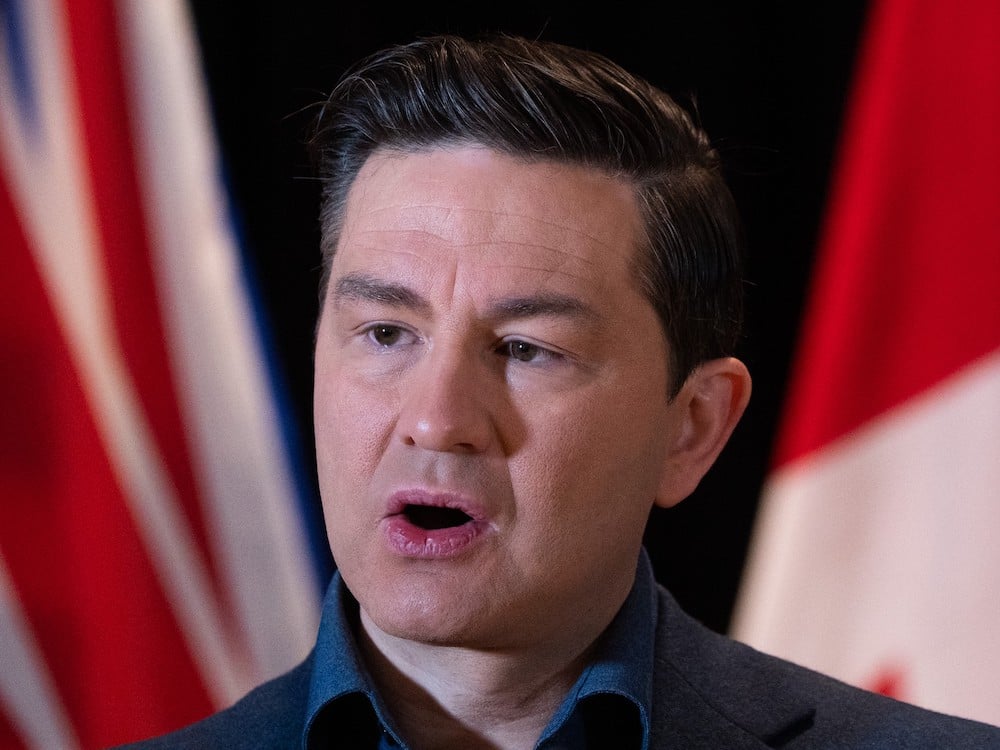If the Conservatives led by Pierre Poilievre win the next election, be prepared for the chance you might end up governed by a guiding notion called “ordered liberty.” It’s a concept shared in Conservative circles as they try to explain why some days their leader declares himself an anti-government defender of personal freedoms, and on others embraces government intrusion in citizens’ lives.
We heard it again after Poilievre came out in favour of a government-mandated age-verification effort to prevent minors from accessing pornography. As reported, that might include submitting a photo of a driver’s licence or a scan of one’s own face to some government or corporate entity.
If that sounds a bit, say, Orwellian, former Stephen Harper aide Sean Speer took to the pages of the Hub, a right-wing online news, commentary and analysis site, to attempt to reconcile the big-state, anti-liberty implications of the endeavour with Poilievre’s commitment to libertarianism.
Like Harper and Jason Kenney before him, Speer notes, Poilievre seems to endorse a vision of “ordered liberty,” which is “a synthesis between liberal ideals of individual autonomy and freedom and traditional understandings of social norms and values.” Speer seems unconcerned by the wiggle room the handy oxymoron might offer an enterprising politician convinced that the “order” bit both precedes and trumps the “liberty” bit, the path favoured by authoritarian populists in the mould of Donald Trump.
It’s not that many were suggesting that minors ought to have free access to pornography. As I argued, the goal of preventing minors from accessing sensitive material online is perfectly reasonable. It’s how the state would prevent it that ought to concern us, given that the available methods quickly tend towards a corporate or state surveillance apparatus that raises concerns for privacy and free expression — commitments that conservatives at least pretend to hold dear. Some in fact do. Peter Menzies was quick to oppose Poilievre’s move, noting “the state has no business in the Wi-Fi of the nation,” and he made that point in the Hub.
In the moments after Poilievre came out in favour of the government forcing companies to verify the age of users who access pornography, his party rushed to clarify that they do not support the means to do so, at least insofar as they’d be robust enough to be workable and effective. Details, details.
Ordered liberty sounds contradictory, like something some tinpot right-wing dictator might call his repressive style of governance. In practice, states are always balancing freedom and order. In fact, in one telling of the story of government, that balancing act is the very point of a state. The philosophical tradition of social contract theory, stretching back in full form to the 17th century, is built on the idea that those who are governed by a state trade some liberty for order. It’s Speer’s — and, presumably, Poilievre’s — attempt to invoke “traditional understandings of social norms and values” that mucks up the waters.
Attempts to preserve or institute traditional social norms and values against a changing social and political order (as Poilievre is also committed to doing in opposing trans rights) through state action are regressive and antithetical to liberty, ordered or otherwise. It’s the equivalent of saying you are perfectly welcome to be free and to exercise your freedom as you so wish, provided you do it in a predetermined correct way consistent with conservative norms and values.
This critique doesn’t apply to supporting attempts to age-verify pornography users to prevent minors from accessing the materials. Age verification is a perfectly reasonable and routine limit to freedoms, subject to debates about precise, ideal age limits. For instance, we generally agree that minors can operate a vehicle at 16, subject to certain restrictions. We could debate raising that to 17 or lowering it to 15, but you won’t find many arguing a seven-year-old ought to be permitted to drive. Or join the army. Or smoke cigarettes.
The tension between Poilievre’s commitment to libertarian maximalist conceptions of freedom and his socially conservative politics is more bound up with the way conservatives like him construct “common sense.” For them, common sense dictates that in a free market, businesses should charge what they can and remain free from state regulations that prevent them from maximizing output and profit. Likewise, it (correctly) dictates that young people shouldn’t access pornography and it’s right to prevent them from doing so. It also (incorrectly) concludes that locker rooms and washrooms ought to be policed to limit where trans people can exist in public.
As I’ve written elsewhere, conservative “common sense” often devolves into culture war as the right attempts to reclaim a lost time. There are surely various impulses that drive these efforts, varied from person to person. But at the heart of “common sense” culture war are fear and prejudice and a consequent commitment to stop the world from changing because it upsets one’s sense of place in the world, just as it threatens to redistribute power and make space for historically marginalized individuals and groups. No doubt there are material causes and implications at work, too. The powerful and comfortable are loath to give up their economic advantages, just as they are terrified of losing their social and cultural dominance.
There’s also politics. Politicians take positions they don’t really believe in because they’re good politics. Poilievre supports supply management of the dairy industry despite his libertarian commitments, for instance. Most Canadian politicians do and would whether it makes good policy or not.
In the months to come, Conservative candidates, MPs and their party leader will take all kinds of conflicting, or tension-laden, positions because they want to win. But beneath the inconsistency will remain a drive to order the world according to their traditional norms and values and to preserve the standing of the powerful and the system that ensures their continued place in the world. Ordered liberty indeed. ![]()
Read more: Federal Politics

















Tyee Commenting Guidelines
Comments that violate guidelines risk being deleted, and violations may result in a temporary or permanent user ban. Maintain the spirit of good conversation to stay in the discussion and be patient with moderators. Comments are reviewed regularly but not in real time.
Do:
Do not: